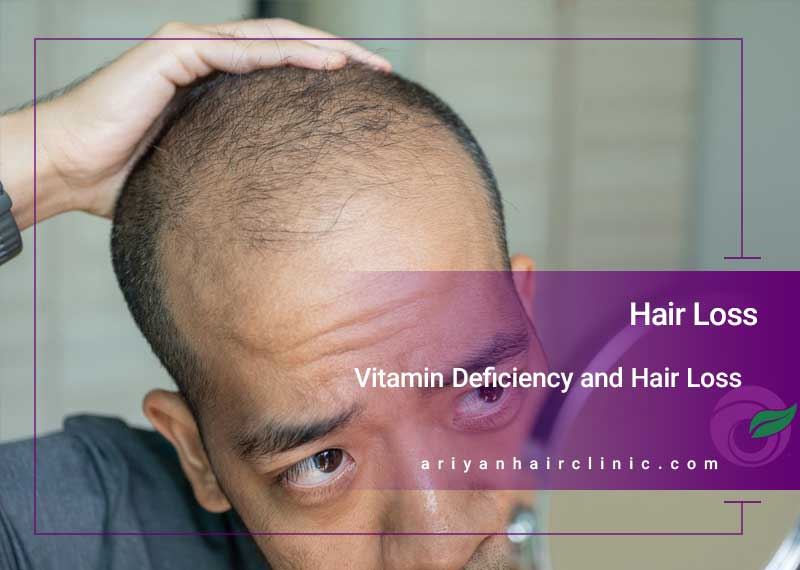Vitamin Deficiency and Hair Loss
1404/06/09

Vitamin deficiency is a major cause of hair loss. At Arian Clinic, we provide advanced solutions including PRP, mesotherapy, laser therapy, and hair transplant, along with nutrition plans to restore healthy hair
Vitamin Deficiency and Hair Loss | Causes, Symptoms, and Treatments
Hair loss is a common concern among both men and women. While genetics and hormonal factors are leading causes, vitamin and mineral deficiencies also play a significant role in weakening hair follicles and slowing down growth. In this article from Arian Clinic, we will explore the essential vitamins and nutrients linked to healthy hair and how their deficiency can contribute to hair loss.
1. Vitamin A and Hair Growth
All cells in the body require vitamin A for growth, and hair – the fastest-growing tissue in the human body – is no exception.
-
Role: Vitamin A helps sebaceous glands produce sebum, a natural oil that moisturizes the scalp and supports healthy hair.
-
Deficiency: Can lead to dry scalp, dandruff, and hair loss.
-
Excess: Overdose of vitamin A may also cause hair loss.
-
Food Sources: Sweet potatoes, carrots, pumpkins, spinach, kale, eggs, dairy products, and cod liver oil.
2. B Vitamins (Especially Biotin)
Biotin (Vitamin B7) is one of the most well-known vitamins for hair health.
-
Role: Biotin supports keratin production, the key protein in hair structure. Other B vitamins help produce red blood cells, which deliver oxygen and nutrients to hair follicles.
-
Deficiency: Leads to thinning and hair shedding.
-
Food Sources: Whole grains, nuts, meat, fish, leafy greens, eggs, and shellfish.
-
Note: Vitamin B12 is mainly found in animal products; vegetarians may require supplements.
3. Vitamin C – A Powerful Antioxidant
-
Role: Neutralizes free radicals, boosts collagen production, and enhances iron absorption – all crucial for strong hair.
-
Deficiency: May result in brittle and weak hair.
-
Food Sources: Citrus fruits, strawberries, bell peppers, and kiwi.
4. Vitamin D and Alopecia
Studies have shown a strong link between low vitamin D levels and alopecia (hair loss).
-
Role: Supports the creation of new hair follicles.
-
Deficiency: A common contributing factor to hair loss worldwide.
-
Food Sources: Sunlight exposure, fatty fish (salmon, sardines), mushrooms, fortified foods, and cod liver oil.
5. Vitamin E – Antioxidant Protection for Hair Follicles
-
Role: Prevents oxidative stress and promotes scalp health.
-
Research: In one 8-month study, vitamin E supplementation improved hair growth in 34% of participants compared to only 0.1% in the placebo group.
-
Food Sources: Sunflower seeds, almonds, spinach, and avocado.
6. Iron – Essential for Oxygen Transport
-
Role: Iron enables red blood cells to carry oxygen to cells, including hair follicles.
-
Deficiency: The most common nutritional cause of hair loss, especially in women.
-
Food Sources: Red meat, liver, eggs, spinach, and lentils.
7. Zinc
-
Role: Plays a vital role in tissue growth, repair, and the function of sebaceous glands around hair follicles.
-
Deficiency: Directly linked to hair shedding.
-
Food Sources: Beef, pumpkin seeds, lentils, and wheat germ.
-
Note: Excess zinc supplementation may paradoxically worsen hair loss.
8. Protein – The Building Block of Hair
Hair is almost entirely made of protein (keratin). Insufficient protein intake slows hair growth and increases shedding.
-
Food Sources: Meat, poultry, fish, eggs, dairy, legumes, and nuts.
Should You Take Supplements for Hair Loss?
The best way to obtain essential vitamins is through a balanced diet. Supplements may help if deficiencies are diagnosed, but taking high doses without medical supervision can be harmful. Research shows supplements work best in individuals with confirmed deficiencies. Always consult a specialist before starting supplementation.
Arian Clinic’s Approach to Hair Loss Treatment
At Arian Clinic, we offer professional consultation and advanced solutions to address hair loss caused by nutritional deficiencies and other factors.
-
Free, personalized consultation with specialists
-
Comprehensive lab tests to detect deficiencies
-
Modern therapies: Mesotherapy, PRP (Platelet-Rich Plasma), Low-Level Laser Therapy (LLLT), and hair transplantation
-
Customized nutrition and supplementation plans to restore healthy hair growth
Conclusion
Vitamin and mineral deficiencies are common yet overlooked causes of hair loss. Ensuring adequate intake through diet or medically supervised supplementation can significantly improve hair health. At Arian Clinic, our team of experts combines advanced medical treatments with nutrition-based strategies to help you achieve stronger, healthier, and fuller hair.


User-Comments